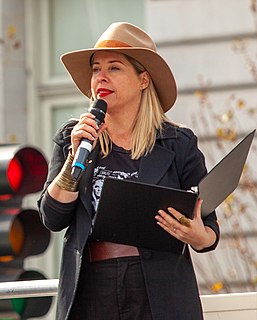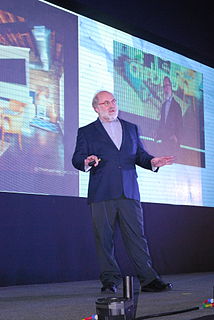A Quote by Albert II, Prince of Monaco
I think very early on, my sisters and I understood the value of nature and what it can do for us, and that we are part of nature. Even if we are all seemingly intelligent beings and we're at the top of the food chain, that doesn't mean that we have to remove ourselves from nature.
Related Quotes
Through a lot of scientific and left-hemisphere thinking in the last 400 years, we've separated ourselves from nature, as if we were superior. We were looking at nature as a resource that we could manipulate. I think we're coming to a new understanding that it's just impossible. We are nature. We can't remove ourselves. We need to think more interdependently.
Our ingenuity in feeding ourselves is prodigious, but at various points our technologies come into conflict with nature's ways of doing things, as when we seek to maximize efficiency by planting crops or raising animals in vast mono-cultures. This is something nature never does, always and for good reasons practicing diversity instead. A great many of the health and environmental problems created by our food system owe to our attempts to oversimplify nature's complexities, at both the growing and the eating ends of our food chain.
The New Age movement, for all the validity of its protest and the value of some of its recommendations, is in truth a very old blind alley. There is a very long history to remind us of what happens when nature is our ultimate point of reference . . . . Nature knows no ethics. There is no right and wrong in nature; the controlling realities are power and fertility.
If the basic human nature was aggressive, we would have been born with animal claws & huge teeth -- but ours are very short, very pretty, very weak! That means we are not well equipped to be aggressive beings. Even the size of our mouth is very small. So I think the basic nature of human beings should be gentle.
We still talk in terms of conquest. We still haven't become mature enough to think of ourselves as only a tiny part of a vast and incredible universe. Man's attitude toward nature is today critically important simply because we have now acquired a fateful power to alter and destroy nature. But man is a part of nature, and his war against nature is inevitably a war against himself.
Many people think that when we practice agriculture, nature is helping us in our efforts to grow food. This is an exclusively human-centered viewpoint... we should instead, realize that we are receiving that which nature decides to give us. A farmer does not grow something in the sense that he or she creates it. That human is only a small part of the whole process by which nature expresses its being. The farmer has very little influence over that process... other than being there and doing his or her small part.
When I speak of knowledge of nature, I do not mean industrial science, which argues that nature is inert and can be understood only to enable humans to manipulate it. I mean that sense of nature that Aldo Leopold had in mind when he said, "A thing is right when it tends to preserve the integrity, stability, and beauty of the biotic community, wrong when it tends otherwise.
After decades of faithful study, ecologists have begun to fathom hidden likenesses among many interwoven systems. ...a canon of nature's laws, strategies, and principles...
Nature runs on sunlight.
Nature uses only the energy it needs.
Nature fits form to function.
Nature recycles everything.
Nature rewards cooperation.
Nature banks on diversity.
Nature demands local expertise.
Nature curbs excesses from within.
Nature taps the power of limits.
Nature is purposeless. Nature simply is. We may find nature beautiful or terrible, but those feelings are human constructions. Such utter and complete mindlessness is hard for us to accept. We feel such a strong connection to nature. But the relationship between nature and us is one-sided. There is no reciprocity. There is no mind on the other side of the wall.







































